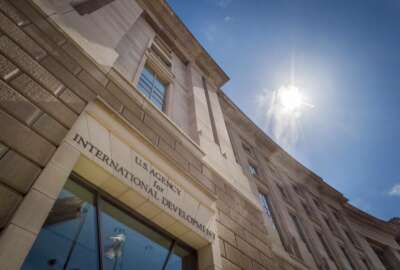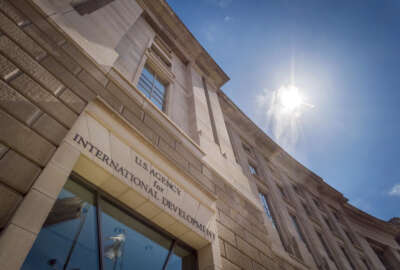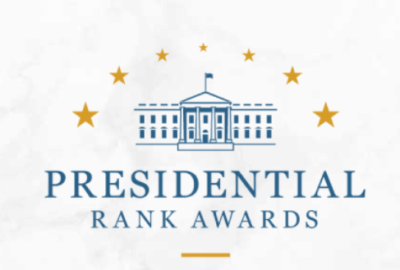Hubbard Radio Washington DC, LLC. All rights reserved. This website is not intended for users located within the European Economic Area.
How procurement supports the mission at USAID
In order to do good around the world, the U.S. Agency for International Development has to buy goods and services and make grants, around the world. It amounts ...
Best listening experience is on Chrome, Firefox or Safari. Subscribe to Federal Drive’s daily audio interviews on Apple Podcasts or PodcastOne.
In order to do good around the world, the U.S. Agency for International Development has to buy goods and services and make grants, around the world. It amounts to more than $20 billion a year. The Federal Drive with Tom Temin spoke to the man overseeing it all who is the recipient recipient of a Presidential Rank Award. Mark Walther is USAID’s senior procurement executive and chief acquisition officer.
Interview transcript:
Tom Temin: Give us a sense of the scope of what it is that you oversee. We know the dollar amount is large, but it’s almost all overseas entities, which is really a procurement challenge. But give us a sense of the scope, the number of countries and the types of acquisitions grants that goes on?
Mark Walther: Sure, we operate in 80 countries overseas. In addition to the programs, we run out of headquarters here in Washington. I oversee approximately 250 contracting and agreement officers both overseas and here in Washington. They have similar contracting and grant making authority within each of the individual missions, as we do here in headquarters, and we contract and grant to a whole range of organizations, local organizations, U.S. firms and nonprofit organizations, U.S. universities, the whole gambit.
Tom Temin: And what are the special challenges of dealing with overseas entities where they’re just simply far away? And they operate, very often, under different financial and governmental systems than we’re used to dealing with U.S. federal contractors?
Mark Walther: Yeah, as you know, Tom, that really is kind of a key area of the challenge in regard to them, not being familiar with U.S. regulations, financial accounting practices and federal regulations of that particular nature. We do, though, take on a variety of techniques to overcome those challenges. We usually use kind of a two step process, a concept paper approach one so that they don’t have to invest significant money to have an approach considered by the agency. We also use kind of fixed amount awards or fixed amount grants where you have milestone payments instead of the cost reimbursement throughout almost like staggered, fixed price payments. So that helps a great deal. We also do a lot of outreach in regard to having a one stop portal. We’ve called it workwithusaid.org so that organizations can do self assessments and have other resource tools available to see how ready they are to partner directly with the agency. And obviously, we partner a lot though, with U.S. firms that also subaward and subcontract with those local entities,
Tom Temin: Do you have contractor officer representatives in those countries that can kind of keep an eye on things for you?
Mark Walther: Yes, we do. So we have our contracting agreement officers in our missions, as well as our corps, and we call them AORs as well. And I’d also like to recognize, too, we have foreign service nationals that serve in our missions as well. Our foreign service nationals or FSNs, as we refer to them, you really have first hand knowledge of local conditions and the environment in those countries. And they’re a highly talented group. And they work hand in hand with our U.S. Foreign Service counterparts in overseeing the kind of the monitoring and oversight of these awards.
Tom Temin: Now the Department of Defense and the State Department also do a fair amount of overseas contracting. Do you ever compare notes with them on outfits and contractors and even grantees?
Mark Walther: Yes, we do have connections with the interagency and other departments. We are kind of unique just in that we do the whole breadth of contracting and grant making, cooperative agreements and other types of engagements, government to government, etc. So kind of the nature of our awards being a multiyear kind of technical assistance and all the different sectors: health, economic growth, democracy, makes us a little different as far as the types of things we’re buying or the activities we’re supporting.
Tom Temin: We’re speaking with Mark Walther, he’s senior procurement executive at the U.S. Agency for International Development, and a new Presidential Rank Award recipient. And with respect to the overseas contracts, they are related to what program USAID is executing in that particular country. So how do the requirements get translated to procurement so that you know exactly what it is you need to buy in terms of not so much, I don’t know goods and services prices and deliveries, but what they’re actually trying to accomplish? That is the mission of the particular program?
Mark Walther: Yeah, our mission directors are working with their host country counterparts to determine what sectors, what areas are priorities within that country. And naturally, we’re also trying to promote U.S. interest in priorities as well. So a lot of the time it just depends on what particular conditions in a country rise to the top. Whether it’s health related concerns, whether it’s advancing private sector engagement, economic growth. And in most cases, we do a variety of programs in each of the individual countries. And it’s just a question of magnitude, depending on the host country counterparts and where the particular emphasis are.
Tom Temin: I’m driving driving at, do the procurement people talk to the program people on a regular basis so that you have a feel for what it is you’re buying and acquiring for?
Mark Walther: Oh, yes, absolutely. Yeah, we kind of use almost an integrated team approach. We are in contact with our technical and program colleagues and vice versa. The more engagement you have, the greater likelihood of better performance and impact. So that is always emphasized across the board to have those relationships with our technical program colleagues, that we collectively do our best in advancing our agency’s mission.
Tom Temin: And how do you deal with subcontracting overseas? Because you want to make sure that the subcontractors are full and legit as the contractors are, and that they’re not sending subcontracts to somebody whose brother-in-law, or some tribal associate, but that it’s on the basis of best value to the U.S. government and to the mission in that country?
Mark Walther: Yeah, our prime contractors are responsible for the competing of subcontracts and subawards. We do do approvals and consents to the particular subawards being active. They would be included in the kind of the monitoring and oversight responsibilities. While we act through the prime in these particular areas, we’re equally as, you know, the entire program scope and performance to make sure accountability is gained across the board.
Tom Temin: And there is some history of the U.S. procurement system being used as a model for developing countries. I remember after the breakup of the U.S.S.R. and all of these newly respond nations turned to the United States for guidance in how to set up governmental procurement systems and other types of processes. Since we know what we’re doing here in general. Do you think that some of the work you’ve done with overseas contractors has maybe translated a little bit more horizontally in those countries, and perhaps help them improve what might not be as sophisticated or as, frankly, honest, a system as we enjoy here?
Mark Walther: Yeah, and I do think we’ve been instrumental in helping ensure a greater capacity within local organizations within the host country governments. And obviously, we also work alongside the multivendor community as well in these areas, in most cases, where we’re all on the ground together, taking advantage or leveraging certain different aspects of our own programs or their activities.
Tom Temin: So in other words, it’s fair to say that the work of procurement in the countries, in the 80 countries, in some sense, expands the direct mission that USAID had going there in the first place.
Mark Walther: Yes, I think procurement has been instrumental, along with, again, our technical areas of emphasis and sector oriented approaches to again, advanced localization, which is a key effort that has been ongoing in advancing more fully.
Tom Temin: All right, and what drives you? What motivates you all these years in procurement? Because you know, from the externally, you and I know better, but externally, people wonder federal procurement, that’s got to be dull. But tell us the real inside story and what has kept you going these years?
Mark Walther: Well, for me personally, it’s the mission of our agency, development and humanitarian assistance at USAID is unique. You think of it as in parallel to the Peace Corps and other efforts where we’re really trying to help and promote individuals that are abroad that are trying to advance in their own capacities. And it’s just a very rewarding environment, the collaboration, both internally with our technical and program and our leadership colleagues, but also with our partner community, our contractors and grantees, we really have been very forward leaning in that space in the partnership arena, and they provide a variety of expertise and insights that we welcome as well.
Tom Temin: And the pandemic aside, normally do you get the chance to hop on a plane and go check things on the ground yourself?
Mark Walther: We do have the opportunity. And there are a lot of TDY travel requests from the field given surge capacities that are needed. So those opportunities are great, and then you get to see firsthand some of the actual benefits of the paper pushing that you do at your desk. So it really is very rewarding to get out into the field and see the programs firsthand.
Tom Temin: Mark Walther is senior procurement executive at the U.S. Agency for International Development, and a new Presidential Rank Award recipient. Thanks so much for joining me.
Mark Walther: Thanks, Tom. It’s been a pleasure. And I’d like to thank my contracting and agreement officer colleagues here in Washington and around the world for their steadfast support and commitment to our agency.
Copyright © 2024 Federal News Network. All rights reserved. This website is not intended for users located within the European Economic Area.
Tom Temin
Tom Temin is host of the Federal Drive and has been providing insight on federal technology and management issues for more than 30 years.
Follow @tteminWFED





